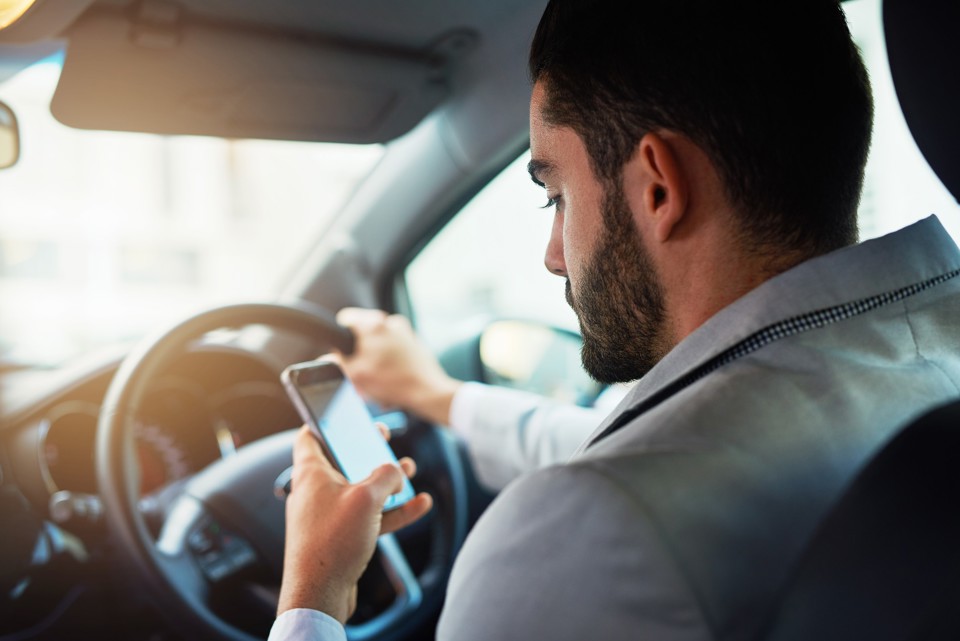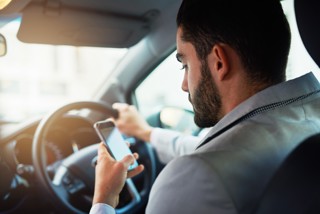The effectiveness of legislation governing use of a handheld mobile phone while driving has been questioned by the High Court.
The law says that an offence is committed if a driver uses a handheld mobile phone for “interactive telecommunication” while behind the wheel.
The phrase reflected how, when the law was written in 2003, smartphones were not in existence and mobile devices were used for sending texts or making calls.
It has enabled lawyers to successfully argue that using a phone’s camera while driving does not constitute “interactive telecommunication”.
The Director of Public Prosecutions had lodged an appeal with the High Court after Ramsey Barreto had a conviction quashed for filming a crash on his mobile phone.
The 51-year-old was prosecuted and found guilty after police saw him driving past an accident using his phone to make a video. However, he had the conviction overturned at Isleworth Crown Court, last October, after his lawyers successfully argued that the law only banned the use of mobile phones to speak or communicate while behind the wheel.
Publishing its decision yesterday (Wednesday, July 31), the High Court dismissed the appeal, agreeing with Barreto’s lawyers.
In its conclusion, it said: “It would have been much better to have drafted legislation which was less cumbersome but its effect is clear.
“The legislation does not prohibit all use of a mobile phone held while driving. It prohibits driving while using a mobile phone or other device for calls and other interactive communication (and holding it at some stage during that process).”
Barreto’s solicitor Emma Patterson, who successfully argued the case, said: “We are absolutely delighted with the outcome of this case.
“We have been arguing for many years that the legislation in relation to the offence of using a handheld mobile phone whilst driving a motor vehicle has failed to keep pace with the evolution of smart phones.
“The increasing multi-functionality of smart phones was, in fact, making a mockery of the law.”
She continued: “We ended up with a situation where you could hold a Casio calculator performing mathematical calculations whilst driving and you would not be committing a mobile phone offence, whereas doing exactly the same thing on the calculator app on a smart phone, according to the way the Police or Crown Prosecution Service were applying the law, meant you would automatically be committing an offence warranting six points and a hefty fine.”
When the fixed penalty for using a mobile phone was increased from three to six points, and the fixed penalty fine was increased from £100 to £200, Patterson says Parliament should have seized the opportunity to update the legislation in general, not just the penalties. “It seemed like a missed opportunity at the time. A quick fix,” she said.
“This is not a loophole argument. This is simply the correct application and understanding of the law as it currently stands.”
Patterson, of Patterson Law, says drivers who use their phones at the wheel may still be committing an offence of driving without due care and attention, or dangerous driving, “if the standard of driving falls below that expected of a careful and competent driver”.
She added: “We have always said that it is dangerous to interact with any type of device whilst driving a motor vehicle on a road and it was always open to the Police or Prosecution to pursue an allegation of driving without due care and attention or perhaps even dangerous driving.
“That was never the issue. The issue was that the law as it stood created anomalies and confusion.
“We now have the clarity in this judicial precedent to match what we had been correctly advocating on behalf of our clients for many, many years.”
The ruling comes after almost 90% of motorists said they would like to see tougher penalties handed out to other drivers caught using their phone while behind the wheel, according to a new survey by Motorpoint.
The poll found 86.4% of 2,180 people would like to see the police be given greater powers to penalise anyone caught holding their phone while driving.
Following the High Court ruling, UK motoring expert Francis Noakes, of the Get Licensed Driving School, urged lawmakers to revisit the legislation as a ‘matter of urgency’.
He said: “Driving whilst using a mobile phone, contrary to section 110 of the Road Vehicles Regulations 1986, warrants six points on your licence and a standard fine of £200, with a maximum fine of up to £1,000.
“But what this test case shows is that, as it stands, prosecutions are far from straightforward and an offence is difficult to prove.
“The law is designed to prohibit active involvement in communication whilst driving.
“If you use an app that allows you to communicate with other people, you’re committing an offence.
“But there’s now a massive grey area. Is checking the weather on an app an offence? Can you make voice memos in your phone with impunity?
“When it comes to road safety, we simply can’t allow for any uncertainty to exist. I’d urge lawmakers to revisit and tighten the legislation as a matter of urgency.”
Patterson, meanwhile, says that as the law stands it will fall to prosecutors to prove a driver was engaged in ‘interactive telecommunication’ before an offence has been committed.
She concluded: “In May this year, David Beckham was banned from driving for six months for using his mobile phone while behind the wheel.
“In this case, the offence was brought to light because a member of the public photographed Mr Beckham holding a phone as he drove in slowly moving traffic.
“But was Mr Beckham engaged in ‘interactive telecommunication’? We don’t know because the prosecuting lawyers did not present evidence to prove that offence.
“Because of this new test case, historic cases such as Mr Beckham’s can be viewed in a completely different light. And he’s not the only one who might feel aggrieved.”
Read the full High Court judgement here.






















Login to comment
Comments
No comments have been made yet.